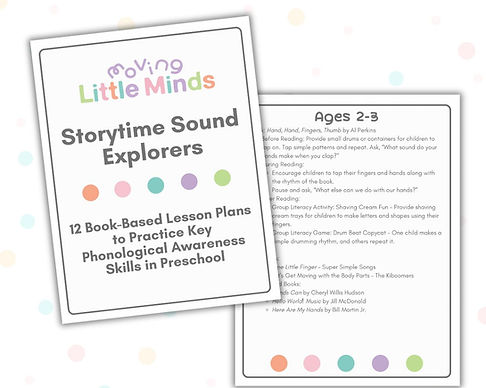Mindset Matters: Teacher Reflection and Refocus This Summer!
- Melissa McCall
- May 29, 2025
- 4 min read
Updated: Jun 5, 2025

It Starts with WHY
Every now and then, a conversation sticks with you, and last week, I had one of those moments.
I was meeting with the director of a local nonprofit, and we were deep in conversation about how we could partner to impact early childhood education. Our conversation shifted to the impact and need for strong teacher training. As we talked about what really makes a difference in classrooms, she said something that stopped me in my tracks:
“I see the greatest results with the children when the teachers are excited about the program. We need that buy-in.”
I looked down at my notebook and smiled, because I had already written one word in all caps on my paper.
BUY-IN.
Because here’s the truth: mindset matters. We can offer the best training, hand teachers the most thoughtful curriculum, and stock the classroom with top-notch materials, but if a teacher doesn’t believe in what they’re doing, if they can’t see the difference they’re making, it won’t stick.
That’s why every single training I lead starts with the WHY.
Why the first five years are critical for brain development
Why the literacy crisis in America starts in early childhood
Why we, as educators, have the power to shift the trajectory
When teachers understand the why, it becomes just a bit easier to push past the low pay, the tough behaviors, the moments of being overlooked or undervalued to remember that YOU are shaping the future!

End-of-Year Reflection: Where Is Your Mindset?
Whether you have been in the classroom for a few years or a few decades, you’ve likely noticed it: things are changing.
Behaviors are shifting. Physical development looks different. Attention spans are shorter. The needs of our children, and the world they’re growing up in are not the same as they once were.
And yet, in the midst of this change, one thing remains true: mindset matters.
As you begin to wind down your school year, whether you're a teacher, director, or homeschool parent, I want to invite you to pause and reflect. Not just on your routines, but on your mindset as an educator in today’s world.
Ask yourself honestly:
Do I see myself as someone who is truly impacting the future—or just going through the motions?
Am I open to new research and willing to shift my practices as we learn more about how young children grow and learn?
Can I let go of strategies or beliefs that may have worked “back then” but aren’t serving children today?
Am I staying curious, flexible, and hopeful—even when the job is hard?
These questions aren’t always easy—but they’re necessary if we want to grow.
Let’s Reflect Together: Your Mindset Matters Reflection Sheet

We’ve created a simple 6-part reflection tool you can use alone, with your team, or during professional development. Download it HERE!
Here’s how it works:
Section 1: What were my top 3 challenges this year?
Think broadly. This could include student behavior, curriculum struggles, work-life balance, staff dynamics, or family communication.
Example: Struggled with getting children to stay engaged during circle time.
Section 2: Why did this challenge occur?
Dig deeper. Consider environment, expectations, training, family or school support, or internal mindset.
Example: I was trying to push through a rigid schedule instead of following the children’s developmental needs or energy.
Section 3: What mindset belief can I let go of?
What belief may be holding you back from growth or change?
Example: “Children should be able to sit during my circle time. They could in the past. I am sticking to my plan regardless.”
Let it go.
Section 4: What can I learn to improve next year?
This is about taking action toward change. What skills, tools, or understanding will help you move forward?
Example: I can dig deeper to find research about children’s attention spans in today’s landscape. I can ask for tips and tricks from other teachers that have had success. I can plan to implement more flexible circle time formats next year (perhaps dividing the circle time into two time slots throughout the day or committing to more up and down movement during circle time.)
Section 5: Where can I find these resources?
List 2–3 sources you can explore to support your growth in the area(s) you reflected on. These could include:
A professional development course
A podcast or book
A colleague or mentor
An educational blog or article
A curriculum or teaching tool
Section 6: What are my next steps?
List 3 steps that you plan to take before the next school year.
Example:
Block off one hour next week to read about flexible circle time routines or listen to a podcast on classroom engagement.
Reach out to another teacher or coach who excels at managing circle time and ask if they’d be open to a short chat or idea exchange.
Draft a new version of your circle time routine that includes built-in movement, shorter segments, or alternative engagement strategies.
Take the steps to grow and change as an educator or leader!
Don't miss an update from Moving Little Minds! SUBSCRIBE HERE!

We believe that every child deserves a bright future, and this begins with a strong foundation in early literacy skills. At Moving Little Minds, we are dedicated to providing research-based literacy activities in fun and engaging ways! By merging instruction with play, we ensure that children are reaching their full potential and embark on their educational journey well-prepared for the
future! Let's build those KEY emergent literacy skills together.






















%20(52).jpg)

Comments